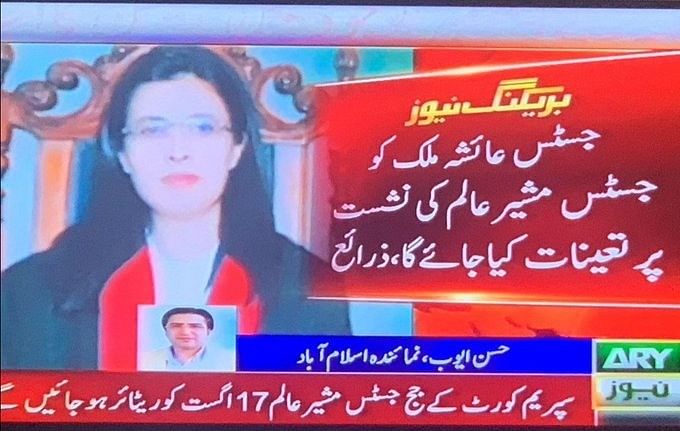New Delhi: Pakistan will get its first woman Supreme Court judge next month. Justice Ayesha Malik will surely shatter the glass ceiling, but many Pakistanis are saying she is no Ruth Bader Ginsburg. ‘Historic’ is a word many used. Others dug through her previous rulings to call her corrupt and compromised.
Breaking:
Chief Justice of Pakistan Gulzar Ahmed has nominated Justice Aysha Malik for the elevation to the Supreme Court. Justice Aysha will be first female judge who is going to elevate to the Supreme Court of Pakistan in history.
— Hasnaat Malik (@HasnaatMalik) August 12, 2021
Islamabad-based television journalist Maria Memon was among many to mention this breaking of the glass ceiling in Pakistan’s male-dominated institutions. “Many more to go,” she added.
Justice Ayesha Malik, a woman in Supreme Court ; another glass ceiling being broken. Many more to go. pic.twitter.com/F58VPHwsSY
— Maria Memon (@Maria_Memon) August 12, 2021
Lawyer and activist Nighat Dad was another to laud the move, saying that Malik “will make history”, when the Judicial Commission of Pakistan (JCP) meets on 9 September “to consider her elevation” to the apex court, as reported by Hasnaat Malik of Tribune.
YouTuber Ali Raza credited Justice Malik for her “historic verdict” in 2016, barring former Prime Minister Nawaz Sharif’s relatives from shifting five sugar mills they owned to a new location.
Do u remember Ayesha Malik; The LHC Justice who had given historic verdict against Sharif family of not installing sugar mills in South Punjab?
She will be recommended for elevation to SCP next month after retirement of Justice Mushir Alam
— Ali Raza (@AliRazaTweets) August 12, 2021
“The judge held that the respondent sugar mills had failed to comply with the requirements of environmental laws and had admittedly not obtained the required permission,” Dawn reported at the time.
However, Justice Malik’s impending promotion is not being universally praised, as she appears to have her critics within Pakistan.
While some social media users were quick to call Justice Malik corrupt in reply to Raza’s tweet, others either questioned her competence in assessing “commercial and tax cases” or called out her entire appointments process, saying she was fourth in the seniority list of Lahore High Court Justices, implying others in-waiting were more deserving.
And also the historic judgement of granting bail to money launderer Shahbaz https://t.co/dhom4e6rr6 kr dai Bhai
— Waqar Ashraf (@WaqarAs98674067) August 12, 2021
Glass is broken! But she is not compentent judge as dealing commercial and tax cases.
— Muhammad Asif (@masifca31) August 12, 2021
بہت اچھے۔ یعنی چونکہ یہ خاتون ہیں تو اس لیے واہ واہ ہے۔ یہ نہیں دیکھنا کہ تین ججوں کو سپر سیڈ کر کے سپریم کورٹ تعیناتی کی جائے گی جو سپریم کورٹ کے اپنے ہی فیصلوں کی خلاف ورزی ہو گی۔
— عوام بنام سرکار (@lawliga) August 12, 2021
Journalist Afia Salam was among those using the seniority line of argument. “I would celebrate if process was followed as she deserves to be there on merit…. seniority being flouted would land her in the same soup as #Sindh judges. She is a brilliant judge but here politics is being played with her. Sad,” Salam said.
I would celebrate if process was followed as she deserves to be there on merit…. seniority being flouted would land her in the same soup as #Sindh judges. She is a brilliant judge but here politics is being played with her. Sad. What say you @FariehaAziz @zfebrahim @rafay_alam https://t.co/DdFFsPi1Rm
— afia salam (@afiasalam) August 13, 2021
Also read: Jemima Goldsmith tweets about Nusrat Fateh Ali Khan. Pakistanis harass her with Imran Khan
In the press
Some lawyers and judges have grown hoarse calling for more representation of women in law, and the Pakistan Superior Judiciary in particular. The debate around representation of women in Pakistan’s judiciary has been there for some time now.
In a 2018 op-ed, Supreme Court advocate Zia Ullah Ranjah wrote, that women lawyers “should be provided a conducive environment so that they may grow as professional lawyers and then be considered for judicial appointments,” and that “the emergence of globalised and progressive societies worldwide requires change in traditional perception about the role of women in Pakistan as well.”
In 2019, senior Pakistan Supreme Court judge Gulzar Ahmed had said that there was a ‘need for true representation of women in judiciary.’
That is why some lawyers have expressed relief at Justice Malik’s appointment to the highest court in the country.
“After a little while we have heard positive news which is very refreshing. Otherwise, we have been hearing bad news of disagreements and controversies in relation to the Judicial Committee of Pakistan,” a lawyer told Dawn, requesting anonymity. The lawyer was referring to the JCP’s intolerance in promoting “younger” judges to positions of seniority.
Also read: Pakistanis scratch their heads over Bhansali’s Netflix series on Lahore’s Heera Mandi
More on Justice Malik
As of January 2021, Justice Ayesha Malik was one of only two female judges among the 40 in the Lahore High Court, according to a BBC profile on her by journalist Benazir Shah. In her report, Shah also cites ‘Women in Law Initiative Pakistan’, according to which, only 15 per cent of judges in Pakistan’s judiciary are women.
Malik began her legal career in Karachi in 1997, before becoming a judge at the Lahore High Court in 2012. In Karachi, she worked at the legal firm of former Chief Election Commissioner of Pakistan and former Governor of Sindh Fakhruddin G. Ebrahim, Hindustan Times says.
With inputs from Simrin Sirur



